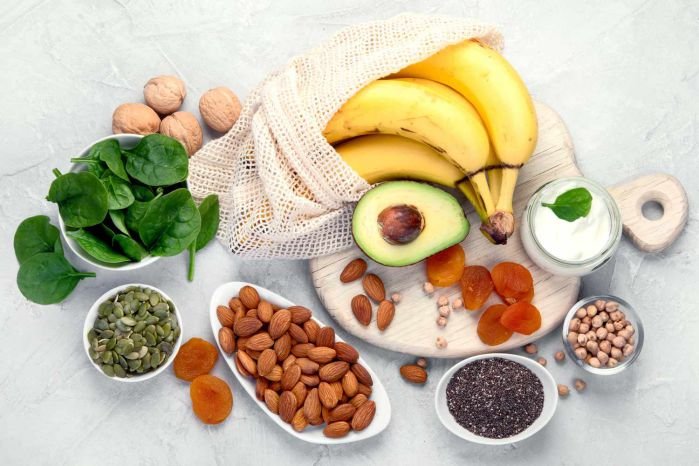What is Potassium?
Potassium is an essential mineral that plays many important roles in the body. As an electrolyte, it works to regulate fluid balance, nerve signaling and muscle contractions. Potassium also supports metabolic functions, regulates blood pressure levels and maintains heart health. Adequate potassium intake promotes overall health and well-being.

Where does Potassium Come From?
While potassium can be obtained through dietary supplements, the best sources are whole foods – especially fruits and vegetables. Our bodies do not produce or store potassium, so it’s important to consume it regularly through meals and snacks. Potassium occurs naturally in plant foods as they contain high levels in their tissues and cells. Meats and other animal products contain small amounts as well. Eating a variety of produce ensures sufficient potassium intake each day.
How Much Potassium Should You Eat?
The recommended daily adequate intake (AI) for potassium is 3,400mg for adults according to the National Institutes of Health. Women should aim for 2,600mg while the target for men is 3,000mg daily. Consistently meeting these potassium goals can support heart and bone health long-term. Focusing meals around fresh produce guarantees adequate intake without supplements.
Fruits and Vegetables High in Potassium
Fruits rich in potassium
Fruits provide an excellent source of potassium in generous amounts with minimal calories. These are among the most potassium packed options:
- Bananas: A medium banana contains 422mg of potassium, making it one of the top sources. Its high potassium combined with magnesium helps regulate blood pressure levels.
- Dried Apricots: Just a serving of 6 dried apricots packs 918mg of potassium for under 100 calories. Their nutrient density makes them a great on-the-go snack.
- Prunes: Similar to apricots in nutrient profile, 5 dried prunes contain 422mg of potassium. They support digestive and heart health as well.
- Avocado: A half avocado has 675mg potassium and provides healthy fats to aid nutrient absorption. Its creamy texture lends itself to many recipes.
- Oranges: For 124 calories, one medium orange supplies 238mg of the mineral. Citrus fruits increase vitamin C and folate intake too.
- Cantaloupe: Half a cup cubed cantaloupe has 206mg potassium. Melons hydrate the body while keeping energy levels balanced.
Vegetables high in potassium
Vegetables also pack high amounts and include:
- Sweet Potato: One medium baked sweet potato contains over 500mg potassium; its skin contains vitamins too.
- Spinach: Half a cup raw spinach has 261mg of potassium as part of its nutrition powerhouse profile.
- Carrots: Six baby carrots provide 260mg potassium with their beta-carotene and fiber.
- Acorn Squash: A cup cubed squash has 879mg of potassium in its rich texture. It bakes up easily in portions.
- Butternut Squash: Similarly to acorn, cubed butternut has 358mg per cup and tastes great roasted as a side.
Other Foods With Potassium
Certain other foods packed with potassium include:
- Tomato products like sauce, paste or diced tomatoes – High in lycopene and potassium.
- Potatoes with skin on – Russet and sweet varieties are top sources with over 700mg per medium spud.
- Black beans and lentils – Excellent plant-based proteins also rich in potassium and fiber.
- Almonds and cashews – Just an ounce of nuts adds over 200mg of this mineral to meals and snacks.
- Dairy like skim milk and yogurt – Provide potassium along with calcium and protein when choosing plain varieties.
In summary, focusing meals regularly around fresh fruits and vegetables helps achieve optimal potassium intake through colorful, nutrient-dense whole foods. Their potassium assists key bodily functions while promoting overall health and well-being naturally.











Discussion about this post